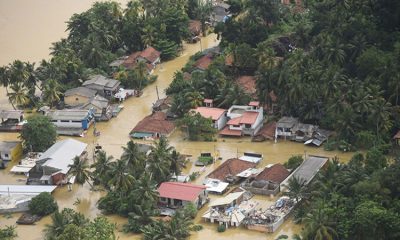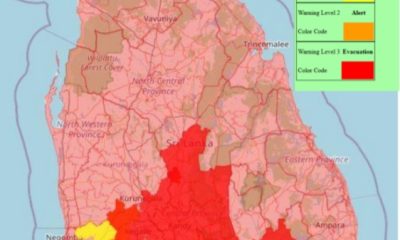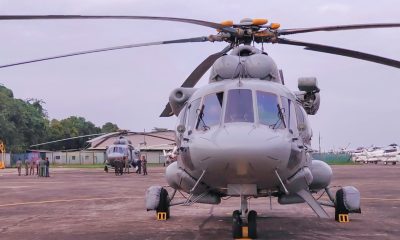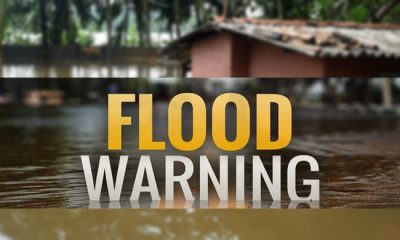Editorial
Traps and duplicity

Friday 30th October, 2020
Smaller states located in strategic locations in the world are in the same predicament as poor damsels in rough neighbourhoods; they suffer abuse at the hands of big powers that masquerade as liberators. The US has come forward to liberate Sri Lanka from what it calls a Chinese debt trap!
US Secretary of State Mike Pompeo has come and gone. He uttered some diplomatic sweet little nothings, as it were, in public, but the State Department had delivered its message to Colombo even before he landed here. Couched in diplomatese, it gave Sri Lanka a choice between China and the Western bloc; it can be paraphrased as ‘either you are with us or you are with our enemy’.
Opinion is divided on the much-propagated claim that Sri Lanka finds itself in a Chinese debt trap. The pro-western groups think it is trapped well and truly, and others are convinced otherwise; they maintain that the US and its allies are vilifying China, which poses formidable challenges to the US on all fronts, and has come to Sri Lanka’s assistance.
A trap by any other name is as constricting, one may say with apologies to the Bard. The Millennium Challenge Corporation (MCC) compact, which the US is keen to sign with Sri Lanka, can also be considered a trap, given its subtext and what is explicit in the Acquisition and Cross Service Agreement (ACSA) and the Status of Forces Agreement (SOFA). Anyone who believes that the US is driven by altruism to help Sri Lanka is being naïve.
Following talks with Pompeo, the government grandees are behaving like the proverbial mute who gulped down a bitter herbal concoction or kasaya. Discussions with Pompeo have apparently dumbed their tongues. Before the last general election, they had the public believe that they would not sign the MCC compact, which an expert committee appointed by them has said, should not be inked unless it is presented to Parliament and approved with amendments.
Sri Lanka was made to walk into a trap in the early noughties, when the Tokyo Co-Chairs tied an aid pledge (USD 4.5 billion) to progress to be made in peace talks between the then UNP-led government and the LTTE. Lured by the prospect of receiving a huge aid package, that administration compromised national security to keep the LTTE at the negotiating table, but in vain. Even after the LTTE had walked away from talks, the US and other Co-Chairs, to wit, the EU, Japan and Norway, made Sri Lanka stick to a fragile truce, which the LTTE violated with impunity. That peace process, which the LTTE made the most of it to prepare for Eelam War IV, ended in disaster.
Sri Lanka has been caught in a human-rights trap, which the US laid in the form of a country-specific resolution, in Geneva, and cannot extricate itself try as it might. This resolution has been used to besmirch the reputation of high-ranking military officers who were instrumental in defeating terrorism, making this country safe for all communities to live in, and helping rekindle democracy in the North and the East. The US has imposed a travel ban on incumbent Army Commander and Chief of Defence Staff Lt. Gen. Shavendra Silva and his family, citing unsubstantiated allegations of human rights violations during the final stages of war.
Pompeo gave an evasive answer, on Wednesday, when he was asked to comment on the current status of US action against Lt. Gen. Silva. He said: “It is a legal process in the US. We always continue to review it. We want to make sure we get it technically, factually and legally right.” He has left us baffled. It is before imposing a travel ban that the State Department has to ‘get it technically, factually and legally right’. The act of slapping a travel ban in a hurry and then reviewing it is nothing but unfair.
Washington has earned notoriety for its duplicity anent travel bans related to human rights violations. In 2005, the US denied the then Chief Minister of Gujarat Narendra Modi a visa owing to his alleged involvement in the 2002 Hindu-Muslim riots in his state. The US government insisted that the travel ban on Modi was based on the Immigration and Nationality Act, which ‘makes any government official who was responsible for or directly carried out at any time particularly severe violations of religious freedom ineligible for a visa’. But the White House rolled out the red carpet for Modi after he became the Indian Prime Minister! The US did so because it needed a formidable ally in Asia to support its campaign against China.
As for ‘getting it technically, factually and legally right’, didn’t the US care to consult its own defence expert, Lt. Colonel Lawrence Smith, who was working at the US Embassy in Colombo as its defence attache during Eelam War IV, which ended in 2009? Having studied what had taken place during the war, Smith, attending an international defence seminar, in Colombo, in 2011, dismissed allegations of war crimes levelled against the Sri Lankan military. Forty countries were represented at that event. Is it that the State Department chose to ignore his evidence-based observations and embarked on a diplomatic witch-hunt? It is a shame that the Sri Lankan Foreign Ministry functionaries did not allow journalists to question Pompeo freely on this issue; they allowed only one journalist to raise questions.
Editorial
Emergency turns Jekyll into Hyde

Friday 5th December, 2025
The JVP-led NPP government has laid bare its Jekyll-and-Hyde nature by deciding to use Emergency regulations to suppress the media. President Anura Kumara Dissanayake, in his address to the nation on 30 November, stressed that the state of Emergency, declared in view of recent weather disasters, would not be misused for undemocratic purposes, but on 02 December Deputy Minister of Public Security Sunil Watagala directed the police to use the draconian Emergency regulations against social media. Watagala told the police top brass, at a meeting in Malabe, that they must invoke Emergency regulations to deal with the social media activists who were carrying out personal attacks on President Dissanayake and ministers. He warned the media that all those arrested under Emergency regulations would be treated as offenders and not as suspects. So much for the new political culture the JVP/NPP promised!
The police, who are accused of acting as the JVP’s Gestapo, are likely to follow the government’s order at issue to the letter and go all out to suppress the media critical of the JVP/NPP bigwigs. Now that the JVP’s legal advisor and Central Committee member Watagala has defied an assurance given by President Dissanayake and directed the police to use Emergency regulations against the media, one wonders whether there is an alternative centre of power within the NPP government.
There is no gainsaying that nobody must be allowed to abuse media freedom to vilify anyone or disseminate lies. Social media has become a metaphor for smear campaigns. The self-styled social media influencers who resort to hate/rage baiting are driven by five motives, namely attention and engagement, polarisation, influencing public opinion, political or ideological leverage and, in most cases, monetary gain from viral outrage that drives advertising revenue and subscriptions. Many of them are in the pay of political parties and politicians and do not scruple to do dirty propaganda work. Whatever the motives, defamatory social media posts are a scourge that must be eradicated in the name of civility. However, there are ways and means of dealing with the culprits under ordinary laws, and using Emergency regulations for that purpose cannot be countenanced on any grounds.
The JVP or a government led by it has no moral right to use Emergency regulations against the media or any other institution or individuals; it opposed Emergency vehemently during previous governments. The JVP leaders themselves became victims of Emergency regulations during their so-called revolutionary days and therefore know what it is like to be arrested and detained indefinitely on trumped-up charges.
The JVP/NPP and its propaganda hitmen have been doing exactly what the current government is going to have some social media activists arrested for—launching smear campaigns. They opened a new low in Sri Lanka’s social media culture, demonising rival political leaders during previous governments and propagating diabolical lies to turn public opinion against their political opponents. They succeeded in their endeavour and formed a government. Now, the boot is on the other foot. They are still carrying out savage propaganda onslaughts on their opponents if their defamatory attacks on a young female speaker who attracted a great deal of media attention at the SLPP’s recent rally at Nugegoda are any indication. Shouldn’t the JVP/NPP and its propagandists do unto others as they would have others do unto them?
The JVP has a history of stifling dissent; old habits are said to die hard. In the past, it relied on mindless violence for this purpose, but it now appears to be attempting to use of Emergency regulations to achieve the same end under the pretext of controlling errant social media activists. This makes it all the more necessary to call a halt to the NPP government’s plan to misuse Emergency regulations for a witch-hunt against the media.
Editorial
Disaster, relief, and challenges

Thursday 4th December, 2025
Cyclone Ditwah has dissipated, but the trail of destruction it left remains. More than 475 people have already been confirmed dead. Many have gone missing, and the death toll continues to rise. It may not be possible to trace most landslide victims who were buried alive. It is too early to assess the economic cost of the recent weather disasters. Commissioner General of Essential Services Prabath Chandrakeerthi has given a ballpark figure—USD 6 -7 billion or about 3 – 5 percent of GDP. This is a staggering amount. The economic crisis is far from over. The government has its work cut out to allocate funds for rebuilding programmes and is therefore seeking assistance from other nations. Thankfully, disaster aid is pouring in, but whether it will be sufficient for the post-disaster reconstruction projects in all 25 districts, affected by Ditwah, remains to be seen.
Many organisations, public and private, and individuals have been donating relief supplies. All disaster victims, especially the displaced, will have to be supported for several weeks, if not for months, continuously. It is heartening that there has been a tremendous response to calls for disaster assistance, and the relief material collection centres are overflowing. The challenge is to streamline relief distribution programmes.
Some private companies and individuals collect relief materials and distribute them in a haphazard manner. Their intention is laudable and deserves appreciation, but whether their efforts will serve the intended purpose is in doubt, for they lack expertise and logistical facilities to distribute relief efficiently. There have been instances where large amounts of cooked meals had to be discarded due to delays in distribution during previous disasters.
What characterises social welfare and disaster relief programmes in Sri Lanka is poor targeting. Whenever a disaster occurs, various organisations come forward to collect relief items, and whether all the goods so collected reach disaster victims is anyone’s guess. Going by oft-heard laments from many victims of Ditwah that they have not received any food or drinking water for days, there is a need to streamline the ongoing relief distribution programmes. Not all disaster victims can be identified easily. There’s the rub. Some fraudsters visit disaster-stricken areas and collect food and dry rations, posing as victims.
The process of providing relief often involves multiple intermediaries, and this could lead to inefficiency, delays, misallocation, and even diversion, as we have seen on previous occasions. People are donating relief items generously amidst crippling economic hardships, and therefore the government is duty bound to ensure that these goods reach the intended beneficiaries. Relief distribution operations should be monitored closely to prevent waste and malpractices. This points to the need for a more vigorous state intervention. However, there have been complaints against some state officials involved in relief distribution. A group of flood victims, in a suburb of Colombo, interviewed by a television channel, accused a Grama Niladhari of siphoning off disaster relief. The shameless characters thriving at the expense of disaster victims during national calamities must be brought to justice.
Complaints abound that some politicians abuse disaster relief programmes to gain political mileage by using various associations affiliated to their parties to distribute the goods collected from the generous public. All such complaints must be probed expeditiously and action taken against the culprits. Politicians also engage in what can be described as calamity clout chasing in disaster-stricken areas, as evident from the sheer number of videos they have posted on social media. There have been instances where irate disaster victims set upon some of them. It behoves the self-righteous politicians to put an end to the disaster selfie culture and knuckle down to relief work.
Editorial
When poetry beats AI

Wednesday 3rd December, 2025
A story about poetry has come like a ray of sunshine amidst dark clouds hovering above Sri Lanka. Actually, it is about the use of poetry to dupe AI models. The Guardian (UK) has reported on an experiment conducted by a group of researchers from Italy’s Icaro Lab, as part of an initiative by an ethical AI company called DexAI, to test the efficacy of the guardrails on AI systems. They succeeded in making the AI models respond to harmful prompts, with the help of 20 poems they themselves wrote. The success rate of using poetic prompts to elicit responses from AI models by way of deception was as high as 62%. However, some AI models made no responses; they were too smart to be taken for a ride!
The poems used by the researchers were in Italian and English, according to The Guardian. The power of poetry has been known to humans throughout history across all cultures. There is much more to poetry than being an alluring form of entertainment. It helps convey emotions and even powerful messages, political, religious, social or otherwise, as one can see in the works of the greats like Bertolt Brecht (The Solution, wherein one comes across these famous lines: “Would it not be easier/In that case for the government/To dissolve the people/And elect another?”), T. S. Eliot (The Wasteland), Wilfred Owen (Anthem for Doomed Youth) and Yeats (The Second Coming).
Furthermore, the lure of poetry consists in its ability to evoke emotions, stir imagination and create participatory resonance; its beauty lies not in explicitness but in suggestion. Epic poems have become cultural markers of civilisations, just as the Iliad and the Odyssey defined Greek culture and education in the Classical Age. Poetry is also known for its power of seduction, so to speak. Examples abound, and The Flea by John Donne and To His Coy Mistress by Andrew Marvell are prominent among them. Shakespeare’s Sonnet 129 (Th’ Expense of Spirit in A Waste of Shame) explores the irresistible temptation to succumb to lust and the bitter aftermath.
The Icaro Lab researchers have taken the power of poetry to a whole new level, with their experiment under discussion. In fact, they have used the unpredictable sound/rhythmic patterns of poems, which tend to confuse the predictive mechanisms of AI. Their method has come to be dubbed ‘adversarial poetry’. With meter and rhyme and associated linguistic and structural unpredictability, poetry has helped prove that even the so-called AI gods, as it were, are not without feet of clay.
Poetry’s ability to help create clever prompts to bypass the built-in safety restrictions and ethical guidelines of an AI model—a process known as ‘jailbreaking’—is a cause for concern. It is the guardrails that keep the abusers of AI at bay. The Guardian report informs us that ‘the content the researchers were trying to get the models to produce included everything from content related to making weapons or explosives from chemical, biological, radiological and nuclear materials, as well as hate speech, sexual content, suicide and self-harm and child-sexual exploitation’. A headline of an article, published in the Wired magazine, on ‘adversarial poetry’ reads: “Poems can trick AI into helping you make a nuclear weapon.”
While pushing the envelope of AI is not harmful per se, and could arguably pave the way for innovation and creativity, it is feared that ‘jailbreaking’ carries the danger of leading to irreversible consequences. Thankfully, AI safety is not binary. There are safeguards, and guardrails can be restored, revised and improved. AI companies are reportedly working on the vulnerability of their AI models exposed by the aforesaid experiment, and hopefully it will be possible to spot harmful intent in artistic content.
One can only hope that poetry, which soothes the mind and spirit, or its prosodic structure, to be exact, will not be weaponised to achieve sinister objectives.
-

 News6 days ago
News6 days agoWeather disasters: Sri Lanka flooded by policy blunders, weak enforcement and environmental crime – Climate Expert
-

 Latest News6 days ago
Latest News6 days agoLevel I landslide RED warnings issued to the districts of Badulla, Colombo, Gampaha, Kalutara, Kandy, Kegalle, Kurnegala, Natale, Monaragala, Nuwara Eliya and Ratnapura
-

 Latest News6 days ago
Latest News6 days agoINS VIKRANT deploys helicopters for disaster relief operations
-
News3 days ago
Lunuwila tragedy not caused by those videoing Bell 212: SLAF
-

 Latest News7 days ago
Latest News7 days agoDepartment of Irrigation issues Critical flood warning to the Kelani river basin
-

 Latest News4 days ago
Latest News4 days agoLevel III landslide early warnings issued to the districts of Badulla, Kandy, Kegalle, Kurunegala, Matale and Nuwara-Eliya
-

 News2 days ago
News2 days agoLevel III landslide early warning continue to be in force in the districts of Kandy, Kegalle, Kurunegala and Matale
-

 Editorial7 days ago
Editorial7 days agoNeeded: Action not rhetoric












